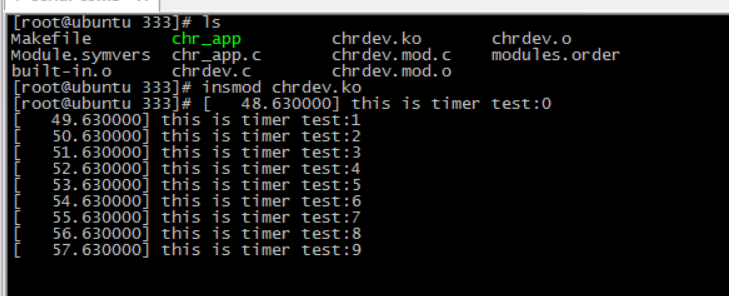目录
- (一)内核定时器介绍
- (二)内核定时器相关接口
- (三)使用步骤
- (四)实例代码
(一)内核定时器介绍
内核定时器并不是用来简单的定时操作,而是在定时时间后,触发事件的操作,类似定时器中断,是内核用来控制在未来某个时间点(基于jiffies)调度执行某个函数的一种机制,内核中采用的定时器以jiffies为单位。 单位秒=jiffies/HZ
几个重要跟时间有关的名词或变数
HZ:Linux核心每隔固定周期会发出timer interrupt (IRQ 0),HZ是用来定义每一秒有几次
timer interrupts。举例来说,HZ为1000,代表每秒有1000次timer interrupts。
Tick:Tick是HZ的倒数,意即timer interrupt每发生一次中断的时间。如HZ为250时,
tick为4毫秒(millisecond)。
Jiffies:Jiffies为Linux核心变数(unsigned long),它被用来记录系统自开机以来,已经过
了多少tick。每发生一次timer interrupt,Jiffies变数会被加一。值得注意的是,
Jiffies于系统开机时,并非初始化成零,而是被设为-300*HZ ,类似Linux系统
中time(日历时间)
(二)内核定时器相关接口
和定时器先关的数据结构:
struct timer_list {
unsigned long expires; //未来时间点,即超时时间
void (*function)(unsigned long);//超时回调函数
unsigned long data; //传递给回调函数的数据,也就是定时器数据
};
初始化定时器相关的数据结构
1. 静态定以定时器数据结构:
#define DEFINE_TIMER(_name, _function, _expires, _data)
struct timer_list _name =
TIMER_INITIALIZER(_function, _expires, _data)
2. 动态初始化:-----手动对变量进行初始化
#define init_timer(timer)
do {
static struct lock_class_key __key;
init_timer_key((timer), #timer, &__key);
} while (0)
可延时定时:
#define init_timer_deferrable(timer)
do {
static struct lock_class_key __key;
init_timer_deferrable_key((timer), #timer, &__key);
} while (0)
设置定时时间
#define setup_timer(timer, fn, data)
do {
static struct lock_class_key __key;
setup_timer_key((timer), #timer, &__key, (fn), (data));
} while (0)
向内核添加定时器:
/**
* add_timer - start a timer
* @timer: the timer to be added
*
* The kernel will do a ->function(->data) callback from the
* timer interrupt at the ->expires point in the future. The
* current time is 'jiffies'.
*
* The timer's ->expires, ->function (and if the handler uses it, ->data)
* fields must be set prior calling this function.
*
* Timers with an ->expires field in the past will be executed in the next
* timer tick.
*/
void add_timer(struct timer_list *timer)
{
BUG_ON(timer_pending(timer));
mod_timer(timer, timer->expires);
}
从内核删除定时器:
/**
* del_timer - deactive a timer.
* @timer: the timer to be deactivated
*
* del_timer() deactivates a timer - this works on both active and inactive
* timers.
*
* The function returns whether it has deactivated a pending timer or not.
* (ie. del_timer() of an inactive timer returns 0, del_timer() of an
* active timer returns 1.)
*/
int del_timer(struct timer_list *timer)
修改定时时间:
/**
* mod_timer - modify a timer's timeout
* @timer: the timer to be modified
* @expires: new timeout in jiffies
*
* mod_timer() is a more efficient way to update the expire field of an
* active timer (if the timer is inactive it will be activated)
*
* mod_timer(timer, expires) is equivalent to:
*
* del_timer(timer); timer->expires = expires; add_timer(timer);
*
* Note that if there are multiple unserialized concurrent users of the
* same timer, then mod_timer() is the only safe way to modify the timeout,
* since add_timer() cannot modify an already running timer.
*
* The function returns whether it has modified a pending timer or not.
* (ie. mod_timer() of an inactive timer returns 0, mod_timer() of an
* active timer returns 1.)
*/
int mod_timer(struct timer_list *timer, unsigned long expires)
jiffies和时间的转换:
extern unsigned int jiffies_to_msecs(const unsigned long j);
extern unsigned int jiffies_to_usecs(const unsigned long j);
extern unsigned long msecs_to_jiffies(const unsigned int m);
extern unsigned long usecs_to_jiffies(const unsigned int u);
(三)使用步骤
1、向内核添加定时器
setup_timer();设置定时器
add_timer();.
2、解绑定时器
int del_timer(struct timer_list *timer)
(四)实例代码
#include <linux/timer.h>
#include <linux/kernel.h>
#include <linux/module.h>
struct timer_list timer;
void function(unsigned long data)
{
static int count=0;
printk("this is timer test:%dn",count++);
mod_timer(&timer,jiffies+1*HZ);
}
static int __init timer_module_init(void)
{
timer.expires = jiffies+5*HZ;
setup_timer(&timer,function,0);
add_timer(&timer);
return 0;
}
static void __exit timer_module_cleanup(void)
{
del_timer(&timer);
}
module_init(timer_module_init);
module_exit(timer_module_cleanup);
MODULE_LICENSE("GPL");

本文章仅供学习交流用禁止用作商业用途,文中内容来水枂编辑,如需转载请告知,谢谢合作
微信公众号:zhjj0729
微博:文艺to青年
最后
以上就是笨笨皮带最近收集整理的关于(十二)linux内核定时器的全部内容,更多相关(十二)linux内核定时器内容请搜索靠谱客的其他文章。
本图文内容来源于网友提供,作为学习参考使用,或来自网络收集整理,版权属于原作者所有。





![[收藏]时钟中断(Timer Interrupt)与 Linux内核调度](https://www.shuijiaxian.com/files_image/reation/bcimg3.png)


发表评论 取消回复